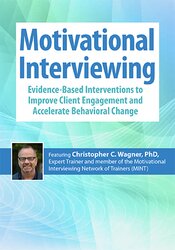

Continuing education credit information is coming soon for this non-interactive self-study package.
CEs may be available for select professions, as listed in the target audience. Hours will be dependent on the actual recording time. Please check with your state licensing board or organization for specific requirements.
There may be an additional fee for CE certificates. Please contact our Customer Service at 1-800-844-8260 for more details.
**Materials that are included in this course may include interventions and modalities that are beyond the authorized practice of your profession. As a licensed professional, you are responsible for reviewing the scope of practice, including activities that are defined in law as beyond the boundaries of practice in accordance with and in compliance with your professions standards.

Christopher C. Wagner, PhD, is a licensed clinical psychologist in Virginia and faculty member at Virginia Commonwealth University, with appointments in Rehabilitation Counseling, Psychology and Psychiatry. He began practicing MI in the 1990s and became a member of the Motivational Interviewing Network of Trainers (MINT) in 1998. From 2000-2008, he served in leadership positions in MINT, twice as chair of the network, and he has led three of their international training-of-trainers events. He was re-elected to the MINT board of directors in 2018.
Dr. Wagner has offered hundreds of MI trainings in North America, Europe, Asia and Australia/Oceania. In addition to focusing on clinical and theoretical advances in individual MI, he has also developed group applications of MI and is an author of the official Guilford series book on that topic, co-written with long-time colleague Karen Ingersoll. He has worked with individuals with a variety of health, mental health, addiction and employment challenges across outpatient, inpatient, residential and corrections settings. Dr. Wagner’s trainings are highly engaging and focused on helping participants incorporate MI skills and strategies into their current styles of practice.
Speaker Disclosures:
Financial: Christopher Wagner has an employment relationship with Virginia Commonwealth University. He receives royalties as a published author. Christopher Wagner receives a speaking honorarium, recording royalties and book royalties. He has no relevant financial relationships with ineligible organizations.
Non-financial: Christopher Wagner is a member of the American Counseling Association, the American Group Psychotherapy Association, and the American Psychological Association.
|
Motivational Interviewing: Evidence-Based Interventions to Improve Client Engagement and Accelerate Behavioral Change
Copyright: 03/17/2022 - Product Code POS054710 |
Access never expires for this product.
Core MI Processes to Cultivate Change
Engaging: The Relational Foundation
| 5 |
|
| 4 |
|
| 3 |
|
| 2 |
|
| 1 |
|
Satisfaction Guarantee
Your satisfaction is our goal and our guarantee. Concerns should be addressed to: PO Box 1000, Eau Claire, WI 54702-1000 or call 1-800-844-8260.
ADA Needs
We would be happy to accommodate your ADA needs; please call our Customer Service Department for more information at 1-800-844-8260.
PESI Mobile App
Access CE trainings on your phone or tablet through our free mobile app. Choose video or audio-only versions of live webcasts and online courses from the world’s best instructors, and complete your CE requirements anywhere, anytime, at your own pace.
Please wait ...